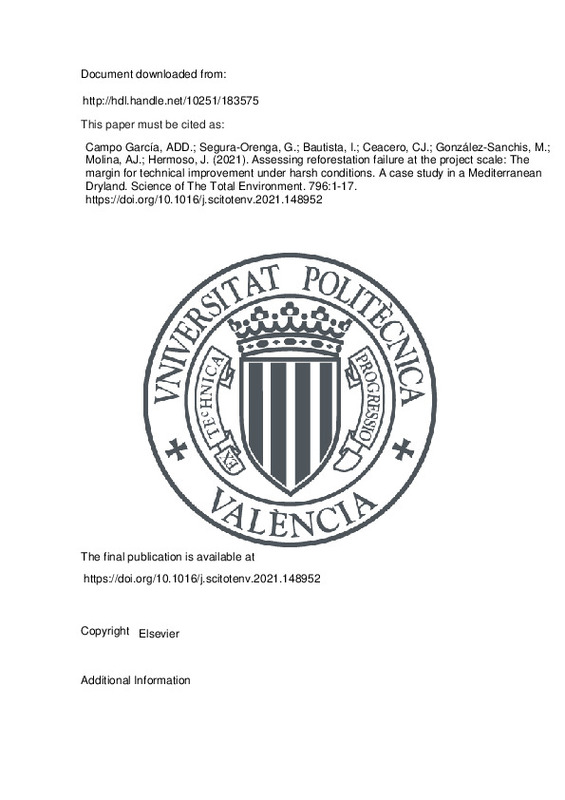JavaScript is disabled for your browser. Some features of this site may not work without it.
Buscar en RiuNet
Listar
Mi cuenta
Estadísticas
Ayuda RiuNet
Admin. UPV
Assessing reforestation failure at the project scale: The margin for technical improvement under harsh conditions. A case study in a Mediterranean Dryland
Mostrar el registro completo del ítem
Campo García, ADD.; Segura-Orenga, G.; Bautista, I.; Ceacero, CJ.; González-Sanchis, M.; Molina, AJ.; Hermoso, J. (2021). Assessing reforestation failure at the project scale: The margin for technical improvement under harsh conditions. A case study in a Mediterranean Dryland. Science of The Total Environment. 796:1-17. https://doi.org/10.1016/j.scitotenv.2021.148952
Por favor, use este identificador para citar o enlazar este ítem: http://hdl.handle.net/10251/183575
Ficheros en el ítem
Metadatos del ítem
| Título: | Assessing reforestation failure at the project scale: The margin for technical improvement under harsh conditions. A case study in a Mediterranean Dryland | |
| Autor: | Segura-Orenga, Guillem Ceacero, Carlos J. Hermoso, Javier | |
| Entidad UPV: |
|
|
| Fecha difusión: |
|
|
| Resumen: |
[EN] Poor reforestation outcomes imply unfulfillment of program goals and might erode institutional willpower and political momentum towards reforestation efforts, affecting both public and private support. However, program ...[+]
|
|
| Palabras clave: |
|
|
| Derechos de uso: | Reconocimiento - No comercial - Sin obra derivada (by-nc-nd) | |
| Fuente: |
|
|
| DOI: |
|
|
| Editorial: |
|
|
| Versión del editor: | https://doi.org/10.1016/j.scitotenv.2021.148952 | |
| Código del Proyecto: |
|
|
| Agradecimientos: |
This study is part of two research projects: "Comprehensive quality control of the reforestation works in the public forests of Cortes de Pallas, Valencia", signed by both the Polytechnic University of Valencia (Re-ForeST) ...[+]
|
|
| Tipo: |
|







![[Cerrado]](/themes/UPV/images/candado.png)


